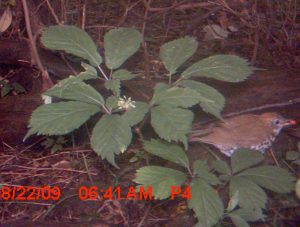
A motion-activated camera catches this wood thrush snacking on a ginseng berry. Photo courtesy of James McGraw
By Kimber Ray
With a bright berry neatly clasped in its beak, the wood thrush is frequently among the usual suspects of long-distance wild ginseng seed dispersal.
For three years, biology professor Jim McGraw and his West Virginia University research team trained motion-activated cameras on this threatened medicinal plant in an attempt to figure out which creature might be responsible for expanding the migration of ginseng’s otherwise gravity-driven seeds.
“Working with a plant like this makes you appreciate how vast our lack of knowledge is,” says McGraw. “Everytime we ask a new question we realize how little we know about this.”
After investigating hundreds of photos and conducting a feeding test with captive wood thrushes, a paper published last year identified this small brown-and-white mottled songbird as the seed dispenser. Unlike other ginseng diners, the thrush regurgitates the seeds intact.
This could offer an important means of transportation for ginseng as the climate continues to warm and disrupts the plant’s habitats. The most venturesome travels are undertaken by juvenile wood thrushes, which may comprise up to a quarter of the population and have been recorded as far as two miles from their nest sites.
“They get picked out of their home territory and go search for new food sources,” says McGraw. “That’s what we think may account for their importance in terms of climate change.”
But it’s unclear whether the wood thrush could beat the pace of climate change which, according to a second paper recently published by McGraw’s lab, will depress rates of growth and reproduction in the plant.
Combined with illegal gathering and overpopulation of deer, McGraw says there are a lot of environmental factors working against ginseng. Still, he adds, “Once we understand the whole ecosystem and how one piece out of balance affects the rest, we’re going to start doing things better.”
Related Articles
Latest News

Leave a comment
Your email address will not be published. Required fields are marked *
One response to “Caught red-handed! Or more accurately, red-beaked”
-
Dear Mr.McGraw,
Read your article on the dispersing of ginseng seeds by the Wood Thrush. I think the most devastating
act of destroying ginseng is in a sense GREED, Loss of habitat,which is population growth, clear cutting and pine plantation planting, which is once more, GREED. Mountain removal is another careless act of GREED. The careless act of digging ginseng and not planting the ripe seed, digging too small and or young a plant is also
responsible for the demise of the plant. I’m glad that bird dispersing of the seed is also being studied. Thank You for giving me an opportunity to voice my opinion.
Judith E.Touchstone





Leave a Comment